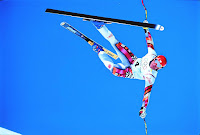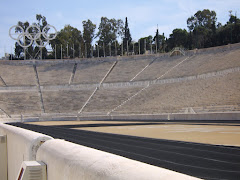The draw? In addition to longstanding curiosity about Georgia O'Keefe's 1949 canvas "Brooklyn Bridge" and other permanent collection works, I was enticed by online promotion of the current exhibition "Who Shot Sports: A Photographic History, 1843 to Present" organized by returning guest curator and author Gail Buckland.
 |
| Georgia O'Keeffe, via Brooklyn Museum Shop |
Both the exhibition and book include images from several A-listers not necessarily know for their still camera work, such as Andy Warhol, Stanley Kubrick and Leni Riefenstahl.
The museum displays, arranged in four galleries divided by a small exhibition-centric gift shop, are organized across eight themes like the chapters of the 300-page volume published by Knopf (with thanks to the author, a review copy arrived at my door not long after we established contact; thanks also to the museum for a review ticket).
 |
| Thomas Pelham Curtis, via Brooklyn Museum |
Rare images captured by members of the first Team USA, and Buckland's wall-text pointing out early cameras used at the first Games, set up a theme described later in this exhibition section: The Olympics are the place at which the latest photo technology is often introduced.
It was fun to spot Sonja Henie skating on a frozen lake in St. Moritz, stills from Riefenstahl's "Olympia" (specifically, elements of an album the filmmaker presented to Adolf Hitler), the original negative of Bob Beamon's record-breaking long jump, and an action shot captured a millisecond before Greg Louganis' head made contact with a Seoul diving board. Buckland's hand-picked images in this five-ringed section, and across most other sections of the exhibition, include more than 60 Olympians or Games-related participants.
 |
| Carl Yarbrough, via Getty Images |
Most breathtaking? Carl Yarbrough's mid-crash image of an airborne Hermann Maier competing in Nagano.
Most famous: Neil Leifer's overhead and ringside images of Muhammad Ali (see below).
One of the largest images on view is from London 2012's beach volleyball venue. The photographer, Donald Miralle, lined up center court just beneath a painter at his easel on the far side of the outdoor grandstand.
By chance, in the press room following Rio 2016's beach volleyball competition, I secured a photograph of the painting by that artist, whose name is Spens. For those who look closely at the images below, some may notice the canvas has grey speck, perhaps representing Miralle in the purple field atop the media seating area (in the photograph, Spens is visible above the window at center):
 |
| Donald Miralle, via Brooklyn Museum |
 |
| Spens, photographed by Wolaver |
Buckland's assorted selections reminded me of familiar sports images while introducing new material. I spotted fresh-to-my-eyes photos of Michael Jordan, Carl Lewis, Jesse Owens, Jackie Joyner-Kersee, Gabby Douglas and Dorothy Hamill.
 |
| Annie Leibovitz, via ArtNet.com |
My hunch -- that some of these sponsor-commissioned works may no longer be Leibovitz's to contribute -- was sort of affirmed in an email exchange with Buckland.
"I do know and like Annie's Atlanta Olympic photographs," wrote Buckland. "With her, there is always many to choose from but she isn't always ready to let an author pick his or her favorite. Saying that, I always loved this picture of Magic Johnson and so do the people visiting the show. I am very pleased that I had permission (with some difficulty) being allowed to reproduce it and exhibit it."
In the book I appreciated Buckland's inclusion of a "Technology Timeline by Nigel Russell" in which the history of sports photography is summarized by decade or year from the earliest image-capturing methods to digital works captured by drone-mounted lenses. Another handy appendix titled "The Beginnings of Sports Photography" takes readers from the first known sports portrait (featuring a posed tennis player) to high-speed action images as technology and the artistry of camera work advanced.
 |
| Tim Clayton, via Brooklyn Museum |
"Who Shot Sports" remains on view at the Brooklyn Museum through January 8, and I highly recommend a trip to see the exhibition as well as checking out Buckland's book.
Book cover image provided by Brooklyn Museum. Two in-exhibition images below by Nicholas Wolaver.
 |
| Neil Leifer, via ArtNet.com |
 |
| Herb Ritts, via Brooklyn Museum |

















No comments:
Post a Comment